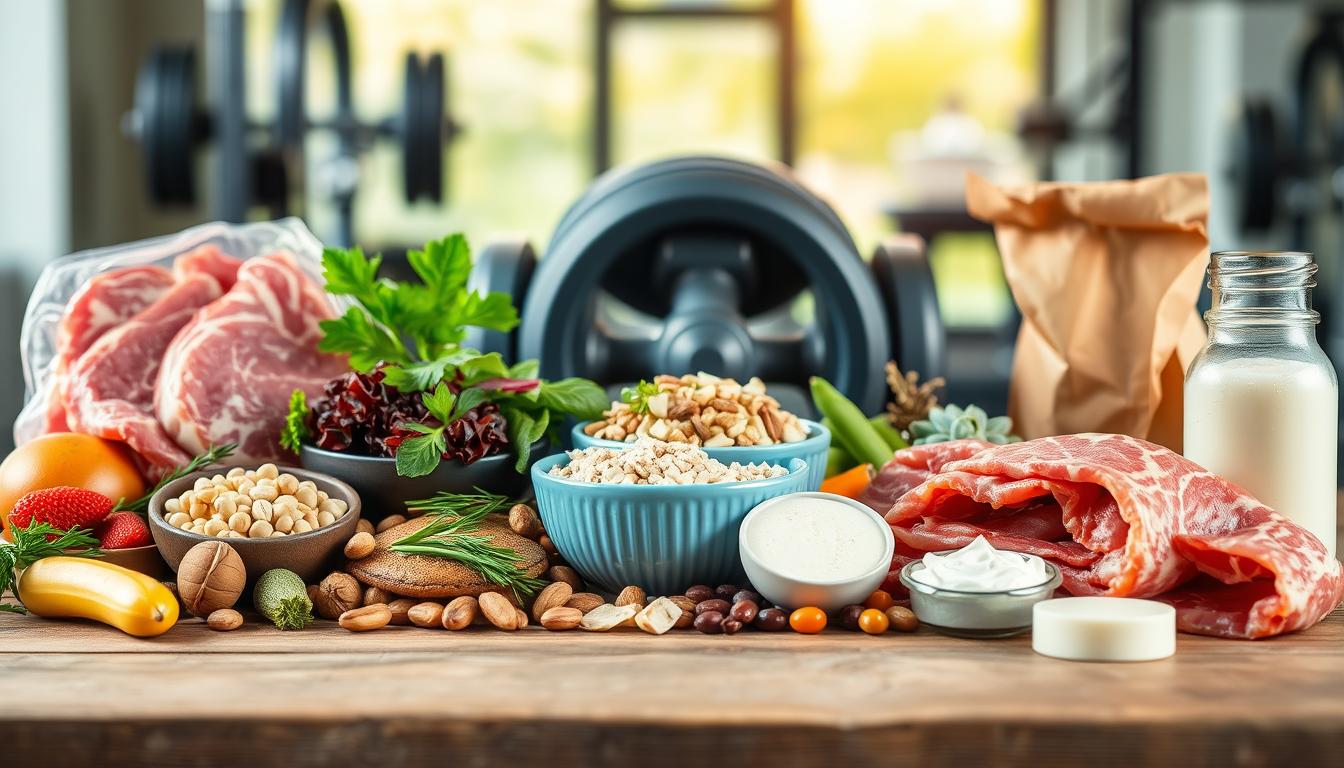The Role of Protein in Fat Loss
Did you know high-protein diets can lead to losing up to 4.9 kg quickly? Yes, it’s true. Protein plays a big role in fat loss, more than just counting calories. With more people choosing protein-rich diets, it’s vital to know how more protein helps with fat loss and body shape improvement.
Protein not only supplies energy but is crucial for fat loss. It makes us feel full and can reduce hunger, thanks to its impact on hormones that control appetite. Studies show that people taking 1.07 to 1.60 grams of protein per kg of their body weight a day lost more weight than those on standard-protein diets. This underlines protein’s importance in fat loss by lessening hunger and boosting metabolism.
Also, protein metabolism helps our bodies burn more calories, which is good for managing weight. Our bodies use more calories to break down protein than fats or carbs. So, diets rich in protein are great for those wanting to control their weight.
Exploring more about protein-rich diets shows they’re not just for losing weight. They also help keep muscles strong while you slim down. This makes your weight loss journey both effective and lasting. Get ready to learn how to use protein in your diet to enjoy its many advantages!
The Role of Protein in Fat Loss
Protein is a key friend when you want to lose weight well. It helps control hunger and manage how much you eat. By eating more protein, you’ll feel full longer and may eat fewer calories. This makes losing weight easier.
Understanding How Protein Affects Appetite
Protein is great at controlling hunger. It reduces the hunger hormone ghrelin and raises hormones that make you feel full. This means you’ll likely eat less throughout the day. Eating protein helps you naturally eat fewer calories by making you feel satisfied longer.
Protein’s Influence on Satiety Hormones
Weight loss is closely tied to hormones, and protein affects this. Eating protein can tell your body it’s full, thanks to certain hormones. A meal high in protein increases hormones like peptide YY and GLP-1. This change helps you feel less hungry. Knowing how protein hormones work in feeling full is important for controlling hunger. Check out this link for more on how protein helps with weight loss:
High-Protein Diets and Their Effect on Hunger
Following a high-protein diet can help you eat less without trying hard. Studies show that making protein about 30% of your calories can cut your calorie intake by about 441 calories a day. This shows the *benefits* of a high-protein diet. It not only helps with weight loss but also makes it simpler by reducing hunger.
Benefits of a Protein-Rich Diet
Eating lots of protein has many benefits, not just making you feel full. It’s key for people wanting to improve their body’s shape. Protein can boost your metabolism and help keep muscle while you lose weight.
Boosting Metabolism with Protein
Protein benefits are amazing, especially for raising your metabolism. Raising your protein from 15% to 30% of total calories can cut down 441 calories daily. This isn’t by chance; protein has a 20% to 35% thermic effect, way more than fats and carbs.
This means eating more protein can help you burn about 260 more calories every day.
Preserving Lean Muscle During Weight Loss
Keeping muscle while losing weight is crucial, and protein is key here. High-protein diets mean less muscle loss. This is important to keep a healthy metabolism.
Overweight women eating 30% of their calories as protein lost about 11 pounds in three months, with no strict diets. Plus, those on high-protein diets lost 53% more fat than those eating normal amounts of protein, even with the same calories. This helps in muscle growth and protein and body composition.
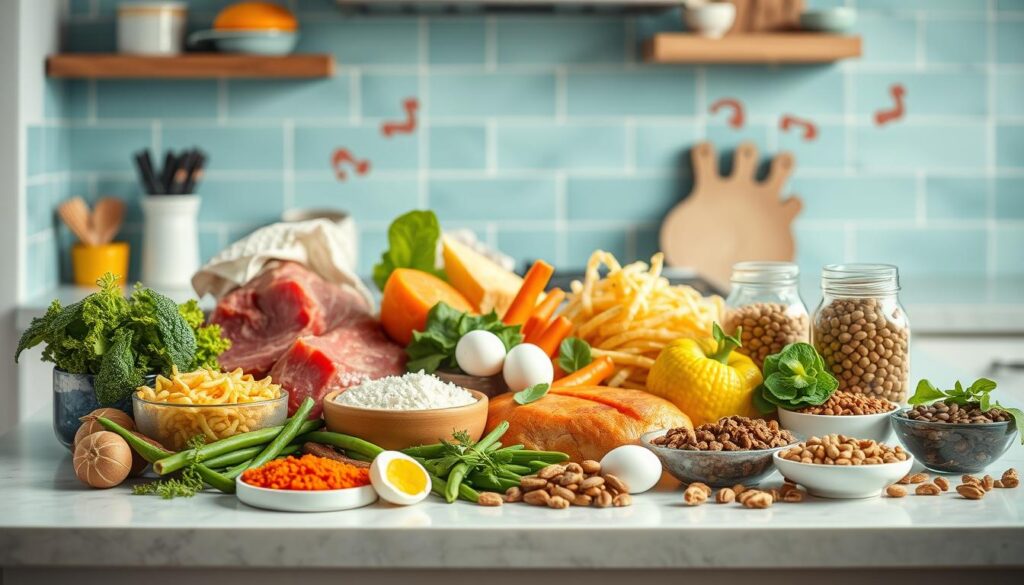
Protein Metabolism and Energy Expenditure
Understanding protein metabolism shows its direct link to energy use. Protein is essential in our diet, with special features affecting energy use. Among the macronutrients, protein’s thermic effect is especially prominent. This leads to interesting insights into maintaining energy balance and managing weight.
The Thermic Effect of Protein
The thermic effect of protein is quite remarkable. It takes more energy to digest than fats and carbs. Research indicates around 20-30% of protein calories are used up during digestion. So, high-protein meals don’t just satisfy hunger; they help burn additional calories afterward. Adding protein regularly to your meals boosts daily energy use. This supports fat loss and aids weight control.
How Protein Affects Resting Energy Expenditure
Eating more protein can increase resting energy expenditure. Keeping more muscle mass during weight loss raises your body’s energy use, even at rest. This is key for a high metabolic rate, which helps burn extra calories naturally, avoiding the common cycle of regaining weight. High-protein diets help in keeping energy levels stable. This makes it easier to prevent unwanted weight gain over time.
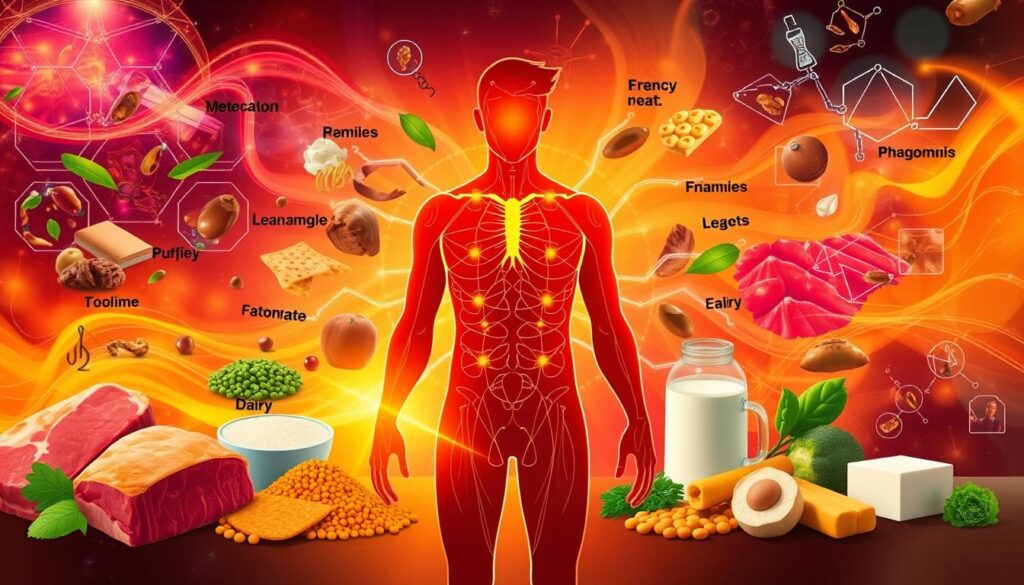
Protein Intake for Fat Loss
Understanding protein and its link to fat loss is vital. The advised protein intake is between 15% and 35% of daily calories. For a 2,000-calorie diet, this means about 150 grams of protein each day. This amount helps with muscle growth and fixes hunger, making it key for weight loss. People wanting to shed weight should take more than the usual 60 grams daily to see better results.
Recommended Protein Intake Levels
For fat loss, the right protein amount is usually 1.2 to 2.5 grams per kilo of body weight. This varies with your health and how active you are. Athletes might need 2.3 to 3.1 g/kg, while overweight folks should aim for 1.2 to 1.5 g/kg. High-protein diets help cut down on calories by making you feel full, thus helping with diet plans. Eating chicken, fish, and beans helps meet your protein needs and supports your health goals.
Guidelines for Optimal Protein Distribution Throughout the Day
Spreading out protein intake during the day is key. Try for 25 to 30 grams of protein in every meal. Pay attention to the timing of protein to keep up energy and metabolism. This method keeps muscle and controls hunger. Studies show that people snacking on high-protein foods felt less hungry, which helped them eat fewer calories. Mixing animal and plant proteins gives you all the amino acids you need and boosts health.
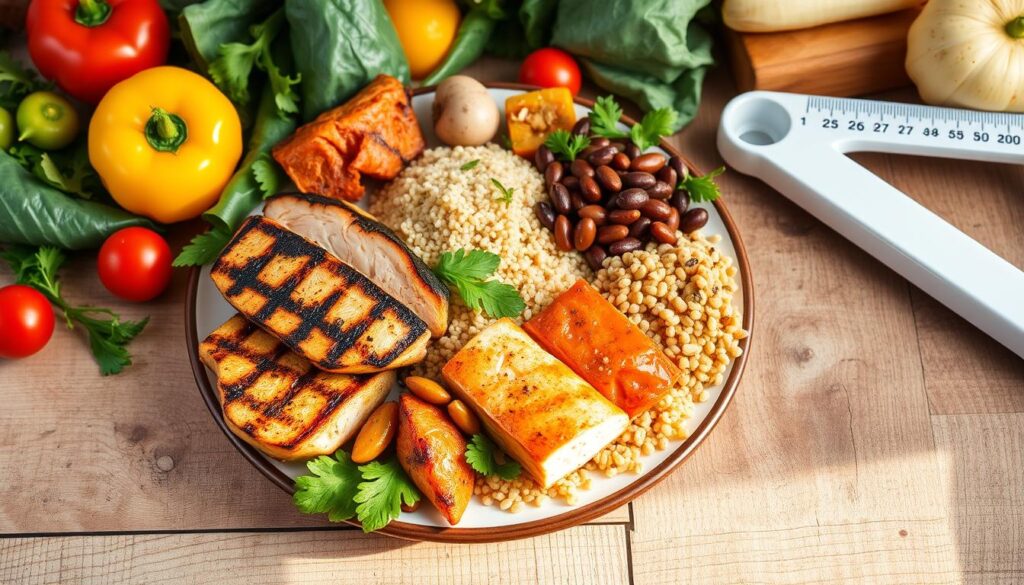
Protein Sources for Fat Loss
Choosing the right protein sources for fat loss is key. Both animal and plant-based proteins are important for a protein-rich diet. They offer unique benefits to help you reach your protein and weight loss goals while eating healthy.
Animal-Based Protein Sources
Animal proteins are complete, having all essential amino acids for muscle repair and growth. Adding these to meals can increase your protein intake:
- Chicken breast: Approximately 26 grams of protein per 3-ounce serving with minimal fat.
- Turkey: Two thick slices provide around 24 grams of protein and only 2 grams of fat.
- Eggs: Each large egg contains about 6 grams of high-quality protein.
- Fish: Options like salmon and sardines are rich in both protein and beneficial omega-3 fatty acids.
- Cottage cheese: A half-cup serving has roughly 14 grams of protein.
These animal protein sources help increase fullness hormones and reduce hunger hormones. This contributes to fat loss and a better metabolism.
Plant-Based Protein Options
If you prefer plant-based diets, there are many nutrient-rich options that aid in weight control:
- Lentils, chickpeas, and beans: These legumes are great sources of fiber and protein.
- Quinoa: Offers approximately 8 grams of protein per serving and is also gluten-free.
- Nuts and seeds: About 6 grams of protein per ounce, with healthy fats encouraging satiety.
- Low-fat Greek yogurt: A substantial protein source with options providing up to 15 grams per serving.
Mixing different plant-based protein sources ensures you get all essential amino acids. This flexible approach is good for those exploring vegan protein choices.
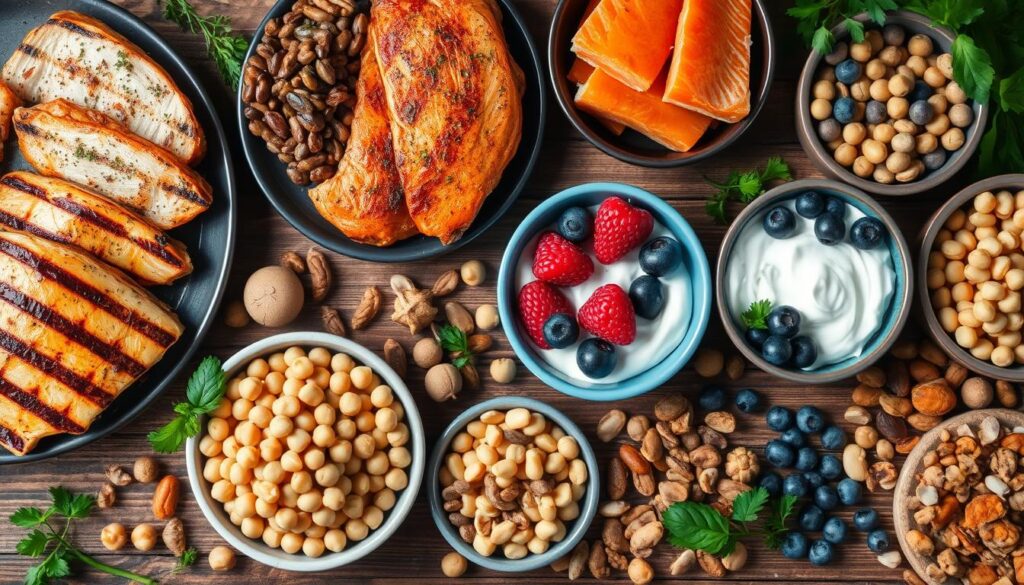
Eating both animal and plant-based proteins helps make better food choices. This supports your weight management efforts. For more info on protein and its benefits, visit this article.
Protein and Muscle Growth
Protein is key for muscle growth and repair. It’s very important in making muscles stronger. It helps a lot when you eat enough protein and work out. This can really help you get better in your fitness goals.
Role of Protein in Muscle Synthesis
The link between protein and getting stronger muscles is huge. Eating enough protein helps muscles heal and get stronger after working out. Research shows that people who eat about 30 grams of protein all day long can gain 25% more muscle than others.
If you want the best results, you should eat 1 to 1.5 grams of protein for every kilogram you weigh. This depends on what you’re aiming for and your body type.
Importance of Strength Training Alongside Protein Intake
Protein is important, but lifting weights makes it work better for muscle growth. Mixing workouts with eating lots of protein is great for your muscles. Eating protein-rich foods every 3-4 hours turns on the muscle-making process.
This makes exercise and eating right work together really well. It leads to getting stronger and a better body. If you work hard in the gym and eat right, you’ll see big changes.
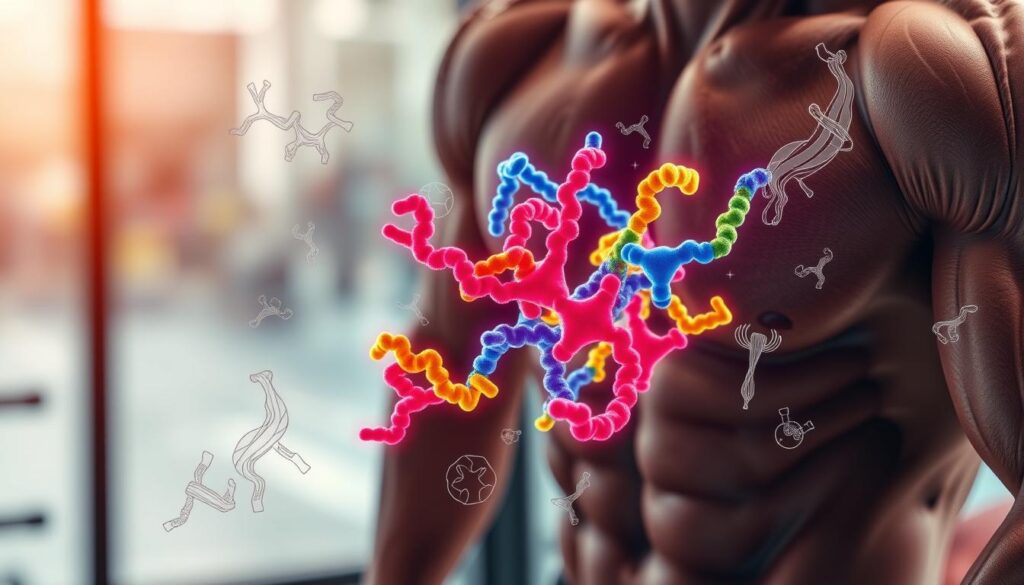
Long-Term Weight Management with High Protein Diets
Keeping the weight off can be tough. But high-protein diets might give you the edge you need. A lot of research shows they keep you full longer. They also help protect against putting weight back on. When people eat more protein, they often have an easier time keeping their weight stable.
One big plus of protein is how it makes you less hungry. It boosts hunger-fighting hormones, making it easier to resist extra snacks. Studies show folks eating enough protein stick to healthier eating easier. They also keep their muscle mass. This helps keep metabolism high.
But, high-protein diets need to be handled wisely. They work, but they can also bring health risks if you’re not careful. Cutting too many carbs, for example, can lead to missing out on nutrients. Always talk to a doctor before starting a protein-heavy diet. To learn about the possible downsides, visit the Mayo Clinic.
- Macronutrients Explained: Everything You Need to Know - January 22, 2025
- The Role of Protein in Fat Loss - January 21, 2025
- Macronutrients and Fat Loss: Optimizing Your Diet - January 19, 2025
